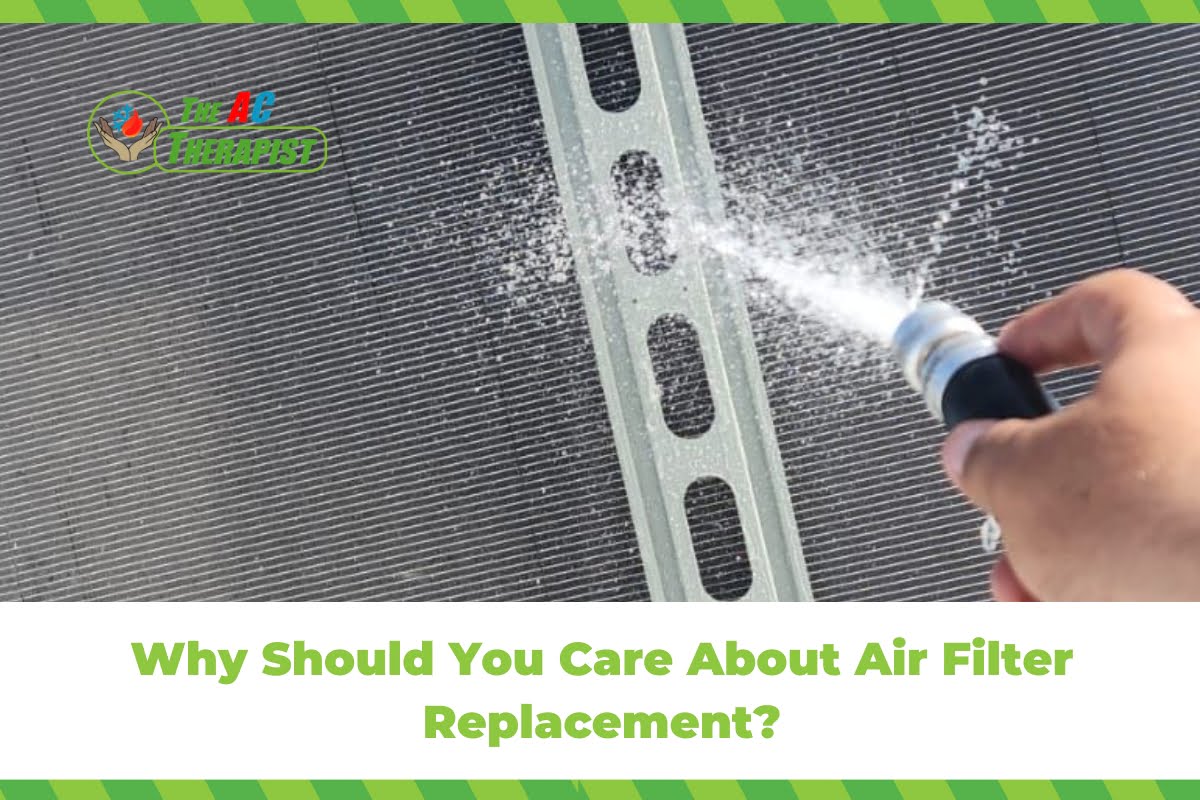Why Should You Care About Air Filter Replacement?
At The AC Therapist, we recognize the integral role of air filter replacement in maintaining a healthy indoor environment. Our expertise and dedicated service take the guesswork out of filter maintenance, ensuring that you enjoy the full spectrum of benefits that come with clean air filters. From enhanced air quality to energy savings and prolonged HVAC life, the reasons to care about air filter replacement are indeed compelling. Let us help you achieve a cleaner, more comfortable living space through timely filter replacements.
Air filter replacement might seem like a minor task in the grand scheme of maintaining your HVAC system, but it holds significant implications for your indoor comfort, health, and the efficiency of your equipment. Let’s delve into five compelling reasons why you should prioritize regular air filter replacement:
1. Enhanced Indoor Air Quality: The air you breathe indoors directly impacts your well-being. Air filters are your first line of defense against airborne particles like dust, pollen, pet dander, and even bacteria. Regular replacement ensures that these pollutants are effectively captured, resulting in cleaner air and reduced respiratory irritants.
2. Improved HVAC Efficiency: When air filters become clogged with debris, they restrict airflow, making your HVAC system work harder to maintain desired temperatures. This strains the system and increases energy consumption. By replacing filters, you allow proper airflow, ensuring optimal HVAC efficiency and lower energy bills.
3. Prolonged Equipment Lifespan: HVAC systems are a significant investment. Neglecting air filter replacement can lead to dust accumulation on sensitive components, causing wear and tear. Regular replacement reduces strain, extends the system’s lifespan, and minimizes the risk of costly breakdowns.
4. Allergy and Asthma Relief: If you or your family members suffer from allergies or asthma, clean air is paramount. High-efficiency filters capture allergens and irritants, offering relief and better indoor comfort. Regular air filter replacement creates an environment that promotes respiratory health.
5. Preventative Maintenance for Savings: The cost of air filter replacement pales in comparison to the potential expenses of repairs caused by neglected filters. Preventative maintenance is a cost-effective strategy to avoid system malfunctions and prolong the life of your HVAC equipment.
What is an air filter in HVAC?
An air filter in HVAC (Heating, Ventilation, and Air Conditioning) systems is a device designed to trap and remove airborne particles from the air that circulates within a building’s heating and cooling system. It serves as a barrier that prevents contaminants like dust, pollen, pet dander, mold spores, bacteria, and other particles from entering the HVAC system and being recirculated throughout indoor spaces.
Air filters are typically made of materials like fiberglass, pleated fabric, or synthetic fibers. These materials create a porous barrier that allows air to pass through while capturing and trapping the particles present in the air. The level of filtration efficiency can vary depending on the type of filter used.
Regular maintenance of air filters is essential to ensure their effectiveness. Over time, air filters can become clogged with captured particles, which restricts airflow and can strain the HVAC system. Therefore, filters need to be cleaned or replaced at recommended intervals to maintain optimal system performance, energy efficiency, and indoor air quality.
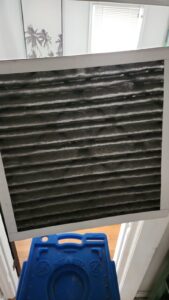
The Role of Air Filters in Air Conditioners
Air filters are an essential component of air conditioning systems, tasked with capturing and removing airborne particles from the circulating air. These particles include dust, pollen, pet dander, mold spores, bacteria, and even tiny pollutants. The filter’s primary function is to improve the quality of the air that occupants breathe indoors by reducing the presence of these contaminants. As The AC Therapist, your commitment to ensuring clean and healthy air aligns perfectly with the vital role of air filters in achieving this goal.
Air conditioning systems serve as a vital component of modern indoor comfort, ensuring optimal temperatures during scorching summers and chilly winters. However, beyond temperature control, air conditioners also play a crucial role in maintaining indoor air quality (IAQ). At the heart of this endeavor lies a seemingly unassuming yet indispensable component: the air filter. In this discussion, we delve into the multifaceted role of air filters in air conditioners, uncovering their impact on IAQ, energy efficiency, system performance, and the overall well-being of occupants.
Air Filter Replacement: A Small Task with Big Impacts on Indoor Comfort and Health
While air filter replacement may seem like a routine maintenance chore, its effects on your indoor environment are anything but ordinary. This seemingly minor task plays a pivotal role in maintaining optimal indoor air quality and ensuring the efficient performance of your HVAC system. Let’s delve into the importance of air filter replacement and the transformative effects it can have on your living spaces.
Air filters play a vital role in the overall functioning of air conditioning systems, impacting both indoor air quality and HVAC performance. Proper maintenance of these filters is essential to ensure their effectiveness in capturing airborne particles and preventing strain on the system. In this guide, we delve into the importance of air filter maintenance in air conditioners, offering insights and tips for maintaining cleaner air and prolonging the life of your HVAC system.
1. Regular Inspection and Replacement
Inspect your air filters regularly to assess their cleanliness. Filters that appear dirty or clogged should be replaced promptly. As a general guideline, standard fiberglass filters may need replacement every 1 to 3 months, while pleated filters can last 3 to 6 months. High-efficiency filters, like HEPA filters, may require replacement every 6 to 12 months.
2. Match Filter Type to Needs
Consider the specific needs of your indoor space when choosing air filters. If occupants have allergies or respiratory sensitivities, opt for higher-efficiency filters that can capture smaller particles. Balancing filtration efficiency with system airflow is crucial to maintaining optimal HVAC performance.
3. Stay Informed about MERV Ratings
MERV (Minimum Efficiency Reporting Value) ratings indicate a filter’s ability to capture particles of varying sizes. A higher MERV rating signifies better filtration. However, filters with higher MERV ratings can also restrict airflow more, so it’s essential to choose a rating suitable for your HVAC system.
4. Timely Replacement
Follow manufacturer recommendations for filter replacement schedules. Factors like usage frequency, presence of pets, and indoor air quality can affect how often filters need replacement. Regular replacement ensures filters remain effective in capturing particles and maintaining system performance.
5. Professional Maintenance
Engage HVAC professionals, such as The AC Therapist, for routine HVAC maintenance. During regular check-ups, they can inspect filters, assess their condition, and provide guidance on replacement or cleaning.
6. Filter Types Matter
Different types of filters require varying maintenance approaches. Disposable filters should be replaced, while washable filters can be cleaned and reused. Ensure proper cleaning procedures are followed for washable filters to maintain their efficiency.
7. Consistent Cleaning Practices
If you have washable filters, follow the manufacturer’s instructions for cleaning frequency and methods. Proper cleaning helps maintain their particle-capturing efficiency and prolong their lifespan.
8. Environmental Considerations
If your living space experiences high levels of dust, pollen, or pollutants, you might need to replace filters more frequently. Environmental factors can impact how quickly filters become dirty and require replacement.
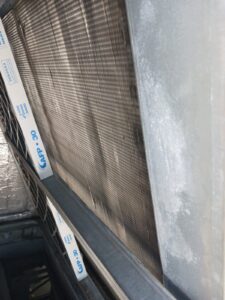
How do you clean HVAC filters?
Cleaning HVAC filters is an essential maintenance task that helps maintain indoor air quality and the efficiency of your heating, ventilation, and air conditioning (HVAC) system. Here’s how you can clean different types of HVAC filters:
1. Disposable Fiberglass Filters: Disposable fiberglass filters are not designed to be cleaned and should be replaced when they become dirty. Look for signs of visible dirt or discoloration, and replace the filter according to the manufacturer’s recommendations.
2. Washable Filters: Washable filters, often made of foam or mesh, can be cleaned and reused.
3. Electrostatic Filters: Electrostatic filters use an electrostatic charge to capture particles and can be either washable or disposable.
4. Pleated Filters: Pleated filters are usually disposable, but some varieties may be labeled as washable. If the manufacturer specifies that they are washable, you can follow the same cleaning steps as washable filters.
General Tips:
- Always follow the manufacturer’s instructions for cleaning and maintenance. Different filters may have specific cleaning recommendations.
- It’s essential to handle filters carefully to avoid damaging the filter media.
- Cleaning should be done gently to avoid damaging the filter fibers or pleats.
- Never use harsh chemicals or excessive pressure to clean filters, as this can damage the filter material and reduce its effectiveness.
Remember that regular cleaning and maintenance are crucial to ensure that your HVAC system operates efficiently. If you’re unsure about the proper cleaning procedure for your specific type of filter, or if you’re not comfortable doing it yourself, consider consulting HVAC professionals like The AC Therapist to ensure proper maintenance and optimal performance of your HVAC system.
How often should HVAC filters be changed?
The frequency at which HVAC filters should be changed can vary based on several factors, including the type of filter, the level of air pollution in the area, and the specific needs of your HVAC system. Here are some general guidelines:
- Type of Filter: Different types of filters have varying lifespans. Standard fiberglass filters might need to be changed every 1 to 3 months, while pleated filters with higher efficiency might last around 3 to 6 months. High-efficiency filters like HEPA filters could last even longer, up to 6 to 12 months.
- Level of Usage: If your HVAC system operates frequently, such as during peak heating or cooling seasons, the filters may need to be changed more often due to the increased airflow.
- Allergies and Health Concerns: If anyone in your household has allergies, asthma, or other respiratory conditions, it’s recommended to change the filters more frequently to maintain better indoor air quality.
- Pets: Homes with pets tend to accumulate more pet dander and hair in the air, which can clog filters faster. If you have pets, you might need to change the filters more often.
- Environmental Factors: If you live in an area with high pollen levels or if there’s ongoing construction nearby, you might need to change filters more frequently to prevent particles from entering your home.
- Manufacturer Recommendations: Always check the manufacturer’s recommendations for your specific HVAC system and the type of filter you’re using. They often provide guidelines on how often filters should be changed for optimal performance.
- Regular Inspection: It’s a good idea to visually inspect your filters every month. If you notice that the filter is visibly dirty or clogged, it’s a sign that it needs to be replaced sooner.
In summary, changing HVAC filters every 1 to 3 months is a common rule of thumb, but it’s important to consider the factors mentioned above to determine the ideal replacement schedule for your specific situation. Regular filter maintenance not only improves indoor air quality but also helps maintain the efficiency and longevity of your HVAC system.
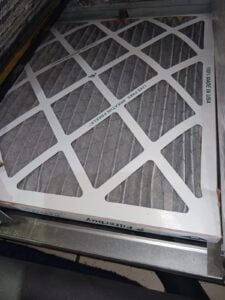
What type of filter is best for HVAC?
The best type of filter for your HVAC system depends on your specific needs, preferences, and any specific concerns you have about indoor air quality. Here are some common types of filters and their characteristics:
- Fiberglass Filters: These are the most basic and inexpensive filters. They capture larger particles like dust and debris, but they may not be very effective at trapping smaller allergens and pollutants. They typically need to be changed every 1 to 3 months.
- Pleated Filters: Pleated filters have more surface area and a higher particle-capturing capacity compared to fiberglass filters. They are available in various levels of filtration efficiency. The higher the MERV (Minimum Efficiency Reporting Value) rating, the better they are at trapping smaller particles. Pleated filters are a good balance between cost and efficiency and usually need replacement every 3 to 6 months.
- High-Efficiency Particulate Air (HEPA) Filters: HEPA filters are among the most efficient filters at capturing even very small particles, including allergens and bacteria. They are commonly used in environments where air quality is critical, such as hospitals or clean rooms. However, HEPA filters may require modifications to your HVAC system to accommodate the increased airflow resistance, and they might need replacement every 6 to 12 months.
- Washable Filters: These filters are reusable and can be washed and reinstalled after they become dirty. While they are environmentally friendly and save money in the long run, they might not offer the same level of filtration as disposable filters. Regular maintenance is essential to ensure their effectiveness.
- Electrostatic Filters: These filters use an electrostatic charge to attract and capture particles. They can be both disposable and washable and are known for their efficiency in trapping smaller particles. However, like HEPA filters, they may create more resistance to airflow and might require more frequent cleaning or replacement.
Ultimately, the best filter for your HVAC system depends on your specific needs, including the level of filtration you desire, any allergies or health concerns, and your budget. Consulting with HVAC professionals, like The AC Therapist, can help you make an informed decision based on your individual circumstances.
How do I know my air filter size?
To determine the size of your air filter, you can follow these steps:
- Check the Current Filter: The easiest way to find your air filter size is to check the size printed on your current filter. The dimensions are usually printed on the side of the filter frame.
- Measure the Filter: If you don’t have a current filter to reference, you can measure the dimensions of the filter slot or the filter’s outer frame where it will be placed. Use a tape measure to measure the width, height, and depth (thickness) of the filter.
- Use the Correct Format: Filter sizes are typically written in the format of width x height x depth. For example, if the width is 16 inches, the height is 20 inches, and the depth is 1 inch, the filter size would be written as 16x20x1.
- Round Up or Down: If your measurements are slightly off from standard sizes, it’s generally recommended to round up to the nearest standard size. Air filters come in standard sizes like 16x20x1, 20x25x1, etc. It’s better to have a slightly larger filter that fits well than a filter that’s too small and doesn’t cover the entire filter slot.
- Check HVAC Manual or Online Resources: If you’re unsure about the filter size or are having trouble finding it, you can refer to your HVAC system’s manual or check the manufacturer’s website for information on recommended filter sizes.
- Consult HVAC Professionals: If you’re still unsure about the correct filter size, HVAC professionals, like The AC Therapist, can provide guidance and assistance in determining the appropriate filter size for your specific HVAC system.
Remember that having the correct filter size is crucial for proper filtration and system performance. Using the wrong size filter can lead to reduced efficiency and airflow issues.
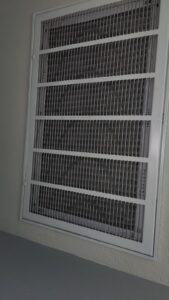
Breathing Easier: Elevate Indoor Comfort with The AC Therapist’s Air Filter Replacement Service
In wrapping up our exploration of the importance of air filter replacement, it becomes evident that this seemingly simple task holds remarkable significance for your indoor environment. From bolstering indoor air quality to optimizing HVAC system performance, the benefits are far-reaching and impactful.
With The AC Therapist’s specialized filter change service, this essential maintenance step is streamlined for your convenience. Our commitment to excellence ensures that your air filters are promptly and effectively replaced, allowing you to reap the rewards of cleaner air and enhanced HVAC efficiency.
As a trusted partner in your pursuit of comfort and well-being, The AC Therapist is dedicated to not only offering expert filter replacement but also alleviating the stress of remembering maintenance schedules. By entrusting us with your air filter needs, you invest in a healthier living space and a more efficient HVAC system.
The AC Therapist’s filter change service bridges the gap between convenience and effective maintenance. Experience the transformative effects of regular air filter replacement and enjoy a space that resonates with freshness, health, and comfort. Your journey to improved indoor air quality and system efficiency starts here—partner with The AC Therapist today for a breath of cleaner, cooler, and more comfortable air.

